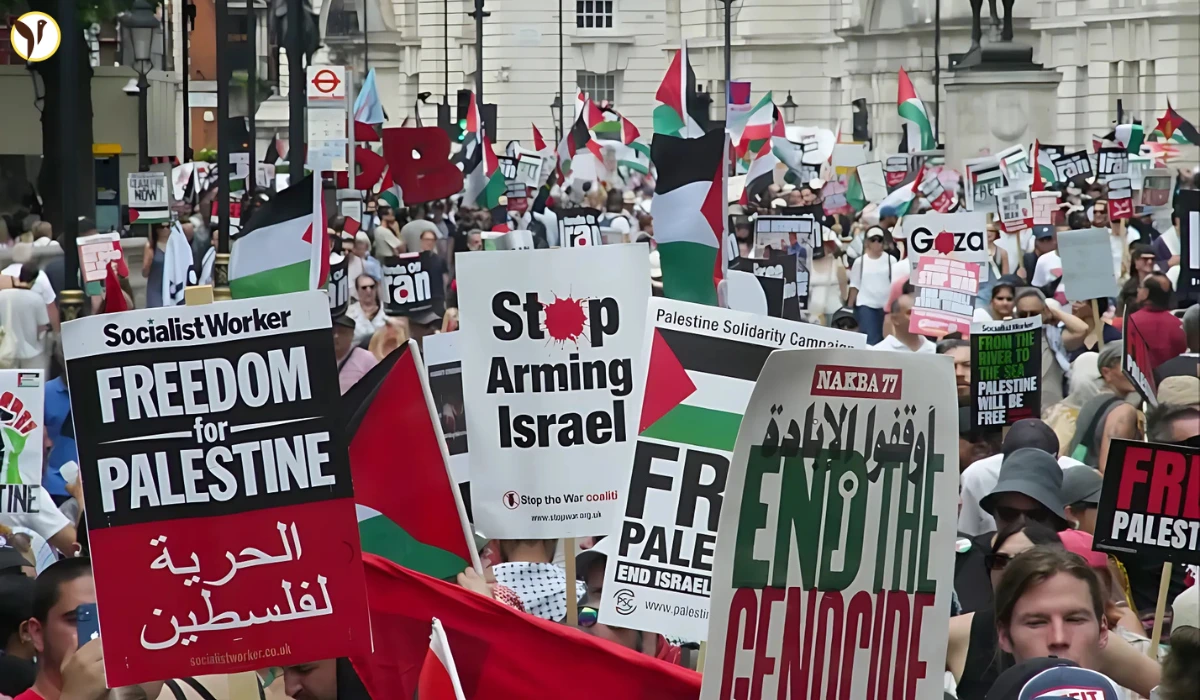I feel like something big is happening when hundreds of people show up, flags waving, voices chanting—right in the heart of London. That’s what unfolded today as protesters gathered at Trafalgar Square after being banned from Westminster. It was intense and emotional. You heard chants of “Stop bombing now” mixed with “Defend protest rights,” and you could almost taste the tension.
These weren’t tourists—it was a real crowd demanding attention. On one side, people wanted to highlight bombing in Gaza and Iran. On the other, some were furious at the police for treating peaceful demonstrators like terrorists. You know, it’s just heartbreaking to see people torn between grief, fear, and anger.
Why the protest moved — and why it matters more now
This protest was supposed to be outside Parliament at noon—but police stepped in and stopped that. They set up a strict exclusion zone under the Public Order Act and gave protesters until 3 pm to leave—or else. That’s when a crowd of about 200 from Palestine Action decided they wouldn’t back down. They said, "We are all Palestine Action," and moved to Trafalgar Square instead.
That change isn’t just geography—it’s a statement, It illustrated togetherness. These people are stretching the limits of protest, in the physical sense, and in the legal sense, to see if you can still protest when the state calls you a terrorist. And that make everyone stop and think: how far is too far?

People in the crowd were handing out legal‑rights cards that warned, “This is symbolic, but we might get arrested.” As predicted 3 were being led away for obstruction by early afternoon. A few bottles and some intense words were exchanged, but it was mostly quiet. But with even palpable force, supporters became defiant and raised their voices, “Let them go!” That is emotion on display - fear deep down inside, and defiance conspicuous and represented in collective output.
What many are not saying - the risks and the deeper shifts
There is much more going on here than is being interpreted. On the surface it is a protest against Gaza, against Iran, and it is there clearly, but deeper beneath the skin, it is about many layers of freedom of speech and the changing notion of what protest full stop is.
Here’s what’s often missed:
-
Legal line blur: Britain’s Home Secretary is set to proscribe Palestine Action as a terrorist group. That means membership, support—even showing up—could land you in jail. Some former police chiefs say this is a dangerous threshold.
-
Public opinion at play: Most here are students and ordinary citizens. Not hardcore radicals. They moved because they feared a widening war—not plotting violence.
-
Global echo: People everywhere are complaining—protests from Amsterdam universities to New York have echoed similar tones. So this isn’t happening in isolation.
-
A new tactic: Palestine Action aren’t just marching. They’re targeting military-related sites with direct actions, like spray-painting jets. That’s raising both sympathy and questions about where activism becomes criminal damage.
These deeper tensions are what make this moment unique. It’s a protest event, yes—but also a test of democratic limits. And that uncertainty is exactly why so many people are tuning in.
Real voices from social media
On Instagram today:
A clip showing hundreds waving flags and chanting.
Emotion in the air — hope, fear, doubt
You could feel the mix of hope and dread. A woman wiped tears away, hugging a friend. A father whispered to his daughter: “This is how change starts.” A student—maybe 20—looked around and said quietly, “I never thought I’d be here, but we’re out of options.”
Others weren’t so sure. A man in his thirties said, “What if this makes things worse? What if it hurts the cause?” That doubt pulsed through the crowd—under the powerful slogans and chants.
Then there were calls to ‘Stop bombing Iran’, loud and clear. That echoed even beyond Gaza talk. People are scared a war that started far away could come closer, real quick. That’s fear, plain and raw, wrapped up in public protest.
What’s next — more protests, legal moves, bigger debate
Today’s protest wraps up at 3 pm. But this is just the start:
-
The Home Secretary will present a draft to proscribe Palestine Action as a terrorist group in Parliament—maybe later today.
-
If that passes, even encouraging the group could land you in prison for 14 years. That’s massive and untested in UK law.
-
Activists say they’re planning more sit-ins and marches—this time targeting military locations and government offices.
-
Legal defenders and former police voice alarm. They argue that people expressing emotion—not planning violence—are being criminalized.
-
The political debate will now shift fast: is this about stopping violence, or shutting down voices?
The coming days are going to decide if this was a powerful stand or a dangerous turning point.
Quick-round bullets to sum it up:
-
Protest moved from Parliament due to an exclusion zone.
-
Chants included Gaza and Iran demands, protest right calls.
-
Three arrests for minor infractions; tense but no major violence.
-
Draft law soon to proscribe Palestine Action under terrorism rules.
-
Supporters see moral urgency; critics warn democracy is at stake.
This is more than a London rally. It’s a test of whether democracy can handle anger without turning it into a crime. And the balance between emotion and law—it’s a thin tightrope we’re watching.









